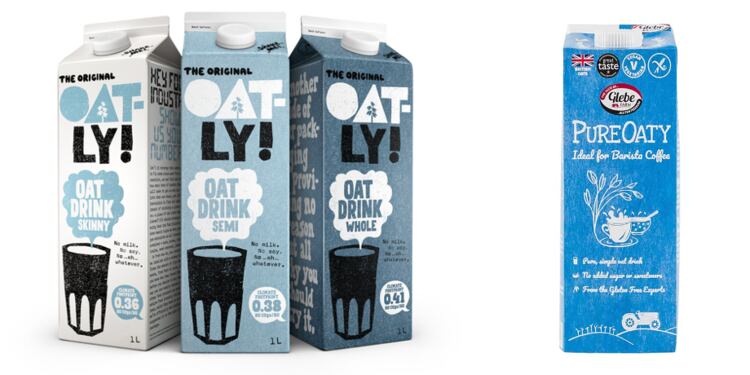The Swedish company says it fully accepts the decision by a UK judge who dismissed all Oatly’s claims of trademark infringement.
Oatly, a pioneer in non-dairy oat milk, took Glebe Farm, a UK business established in oat milling and cereal production for over 30 years and makers of oat milk for nearly three years, to court claiming Glebe’s brand name, PureOaty, and its packaging was too similar to its own.
The court hearing examined wide ranging aspects of alleged relevant intellectual property including choice of language and typefaces, the use of the colour blue and the detail of a coffee cup appearing on the PureOaty pack. The judge ultimately found that there no likelihood of confusion between the PureOaty name and look of the carton, and any of the Oatly trade marks. Further, the judge ruled against Oatly’s allegation that Glebe Farm intended to gain some unfair advantage, and having reviewed all the evidence and contemporaneous documents he was fully satisfied that there was no intention as attributed by Oatly.
Glebe Farm said the decision marked a victory for consumer choice amid a growing appetite for milk alternatives and said it has received huge support from around the world including 130,000 signatures on a change.org petition; with many framing the case as a ‘David and Goliath’ battle. The two oat milk makers have also since become mixed up in a competition over carbon footprint calculations.
Phillip Rayner, owner and Managing Director of Glebe Farm said: “It is enormously gratifying that the judge has ruled in our favour, and to see that smaller independent companies can fight back and win.
“We have had the threat of this court case - which has pitched our challenger brand against Oatly’s multinational business - looming over us for more than a year. We have always felt certain that we have done nothing wrong, and we were determined to fight Oatly’s claims that our brands were similar - something that is now proven to be wrong.
“You only need to look at the two products and packaging side by side to appreciate how different these brands are, and how unnecessary this legal action was.”
The Swedish company – which went public on the New York stock exchange in May – is also embroiled in legal disputes in the US after a report form an activist investor claimed “the walls are collapsing on Oatly’s ambitions to dominate the oat milk market”.
Oatly PR Manager EMEA, Erica Wigge, said: “For all of you who have been following our case with Glebe Farm, well the verdict is in, and we lost. And while to some, this might be seen as vindication for small oat drink companies over big oat drink companies, we actually never saw it that way.
“For us, this case has always been about protecting our trademark and how the single letter Y creates too much of a similarity between Oaty and Oatly. If we were to let one company pass because they, like Glebe Farm, seem to be one of the good guys, that might leave the door open for the bad ones. Truth is, we love all oat drink companies and never brought this case to damage Glebe Farm. In fact, we want them to thrive and help bring products into the world that are good for the planet. We just think they should do so in their own unique voice, just like we do.
“And while we would have preferred a different result, we fully accept the court’s decision and will not make an appeal. We wish Glebe Farm total success in their plant-based journey moving forward.”
Rayner added: “Oatly has claimed that this legal action is just standard business practice. However, it was very clear to us that this was not the case. We decided it was time to stand up to this behaviour, and that in our view ‘corporate might does not make right’.
“The facts are that we have never wanted to be an Oatly clone… Our brand name is PureOaty because our oat milk is made from pure gluten-free oats and just three other ingredients.
“There is room in a growing category for alternatives. We’d like to think growth opportunities come from positivity in broadening sector choice, rather than from trying to shut things down and limiting consumer options.”
Cameron Malone-Brown, trade mark specialist at European IP law firm, Potter Clarkson added: “The lesson for new market entrants from today’s ruling is clear — avoid descriptive brands or be prepared to have an uphill battle in enforcing them against third parties. There are clear marketing advantages in adopting descriptive brands, particularly in fledging markets, however, this case highlights the potential limitations on enforcement down the line. It is a precarious line to walk, and today’s decision suggests that Oatly may not have got the balance between evocation and descriptiveness quite right.”


